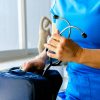Embarking on a career as a travel nurse offers unparalleled flexibility, diverse experiences, and the chance to explore new places while making a significant impact on patient care. However, with the unique nature of temporary assignments in various locations comes a distinct set of financial and administrative responsibilities, particularly concerning taxes. A solid understanding of tax considerations for travel nurses is not just helpful; it’s essential for compliance and financial well-being.
Navigating complex tax rules, understanding concepts like “tax home” and stipends, and knowing which expenses may be deductible can feel overwhelming. But with the right information and proactive approach, travel nurses can confidently manage their tax obligations. This article is designed to provide valuable travel nurse tax tips and outline travel nurse taxes what to know to help you approach tax season with greater clarity.
Table of Contents
The Crucial Concept of a Travel Nurses Tax Home Rules
Perhaps the single most important tax concept for travel nurses is the “tax home.” According to the IRS, your tax home is generally the entire city or general area where your main place of business or work is located, regardless of where you maintain your family home. 1 If you don’t have a regular or main place of business because of the nature of your work, your tax home may be the place where you regularly 2 live. However, if you have neither a regular or main place of business nor a regular place where you live, you are considered a “transient” and your tax home is wherever you work.
Understanding the “Away From Home” Rule
The ability to deduct travel expenses (including for housing and meals) depends on you being “away from home” for tax purposes. This means you are working in a location outside of your tax home, and the assignment is temporary (generally expected to last, and does last, for one year or less). If an assignment is expected to last more than one year, it is not considered temporary, and you are not considered “away from home” for tax purposes at that location.
Establishing and Maintaining Your Tax Home
For many travel nurses, their tax home is the location where they maintain a permanent residence and incur ongoing living expenses, even while working on assignments elsewhere. To claim this location as your tax home for the purpose of deducting travel expenses or receiving non-taxable stipends, you must meet specific IRS criteria that demonstrate significant ties to that location and that you are incurring duplicate expenses. This typically involves maintaining a dwelling in that location (e.g., owning a home, paying rent) and incurring substantial expenses for maintaining that home that you are not reimbursed for. Understanding and adhering to travel nurse tax home rules is foundational.
Understanding Travel Nurse Stipends Tax Implications
A significant part of a travel nurse’s compensation package often comes in the form of stipends for housing, meals, and incidentals (M&IE). These are often referred to as per diems.
Stipends vs. Wages: What’s the Difference?
Wages (or base pay) are taxable income and are reported on your W-2. Stipends, on the other hand, are intended to cover the expenses incurred while working away from your tax home. Under specific IRS rules, these stipends can be provided as non-taxable reimbursements if you have a tax home and are working on a temporary assignment away from that tax home, and the stipend amount does not exceed the IRS-approved per diem rates for that location.
When Stipends Can Become Taxable
It’s crucial to understand that travel nurse stipends tax status is conditional. If you do not have a tax home, or if your assignment is not considered temporary by the IRS standards, then any stipends you receive become taxable income. They should then be included in Box 1 of your W-2 by your agency, and you would potentially be able to deduct your actual expenses (subject to limitations) if you itemize deductions. Simply receiving a stipend does not automatically make it non-taxable; your individual tax situation and compliance with travel nurse tax home rules determine its taxability. This is a key part of travel nurse taxes what to know.
Common Travel Nurse Deductible Expenses
If you successfully establish and maintain a tax home and work on temporary assignments away from that tax home, you may be eligible to deduct certain work-related travel expenses. However, these deductions are often possible because you are incurring duplicate expenses (i.e., maintaining your tax home while also paying for expenses at the assignment location).
Travel Expenses To and From Assignments
This can include the cost of transportation to and from your assignment location, such as airfare, train tickets, bus fares, or the cost of driving your personal vehicle (either actual expenses or the standard mileage rate). Parking fees and tolls incurred during travel can also be included in travel nurse deductible expenses.
Duplicated Housing Costs
If your stipend does not fully cover your housing costs at the assignment location AND you are also incurring significant expenses to maintain your tax home, you may be able to deduct the unreimbursed housing expenses at the assignment location. This deduction is specifically for the duplicated expense of maintaining two residences due to your work travel. It’s vital to have clear documentation of both sets of expenses. This relates to the travel nurse housing stipend tax implications.
Duplicated Meal Costs
Similarly, if your stipend does not cover all your meal costs while away from your tax home, and you are duplicating meal expenses by maintaining a home elsewhere, you may be able to deduct the unreimbursed meal costs. The deduction for meals while traveling for work is typically subject to a 50% limitation. This relates to the travel nurse meal stipend tax implications.
Licensing and Certification Fees
Costs associated with obtaining new state nursing licenses or maintaining required certifications for your travel assignments are generally deductible work-related expenses.
Continuing Education Expenses
Expenses for continuing education courses or programs required to maintain your nursing license or improve your skills for your current job may also be deductible.
Professional Expenses
Other potential travel nurse deductible expenses can include the cost of uniforms (scrubs), professional supplies, union dues, or professional liability insurance premiums not covered by your agency.
Avoiding Common Travel Nurse Tax Mistakes
Mistakes when dealing with travel nurse taxes can be costly. Being aware of common pitfalls is a key travel nurse tax tip.
Misunderstanding the Tax Home
This is arguably the most frequent and significant error. Incorrectly claiming a tax home or failing to meet the IRS criteria for duplicating expenses can lead to significant tax liabilities, interest, and penalties.
Assuming All Stipends are Untouchable
As mentioned, stipends are only non-taxable if specific IRS rules regarding tax home and temporary assignment are met. Simply receiving a stipend doesn’t guarantee its tax-free status.
Neglecting Detailed Record Keeping
The burden of proof for all claimed deductions and the non-taxable status of stipends lies with you. Failure to maintain meticulous records of income, expenses, travel, and tax home expenses is a major risk when filing taxes as a travel nurse.
Incorrectly Classifying Employment Status
Most travel nurses are W-2 employees of their staffing agency. Treating yourself as a 1099 independent contractor when you are not can lead to incorrect tax filings and issues with the IRS. Clarify your employment status with your agency.
Keeping Organized: Essential Records for Filing Taxes as a Travel Nurse
Staying organized throughout the year is the best strategy for smooth tax filing. Maintain a system for tracking income and expenses.
- Contracts and Pay Stubs: Keep copies of all your agency contracts detailing assignment locations, durations, pay rates, and stipend breakdowns. Your pay stubs or earning statements are vital for documenting income and the amounts allocated to wages vs. stipends.
- Detailed Expense Receipts and Logs: For every deductible expense you plan to claim (travel, housing, meals not covered by stipend, professional costs), keep receipts. Maintain a detailed mileage log for any driving related to your assignments.
- Proof of Tax Home Expenses: Gather documentation demonstrating your ongoing expenses at your claimed tax home, such as mortgage statements, rent receipts, utility bills, and property tax statements. This is crucial evidence for duplicating expenses.
- Professional Documentation: Keep records of your nursing licenses, certifications, professional memberships, and documentation of any continuing education.
This meticulous record keeping is essential for filing taxes as a travel nurse accurately and confidently.
Why Professional Guidance is Key for Travel Nurse Tax Planning
Given the complexities of tax laws, the unique situation of travel nurses, and the potential for costly mistakes, seeking professional tax advice is highly recommended. Tax laws change, and interpreting rules like the tax home and stipend taxation requires expertise.
A qualified tax professional experienced with travel healthcare professionals can help you:
- Properly determine your tax home status.
- Correctly report your income and understand the taxability of stipends.
- Identify all eligible travel nurse deductible expenses.
- Navigate state tax filing requirements (you may need to file in multiple states).
- Develop effective travel nurse tax planning strategies for the future.
Investing in expert advice is a crucial travel nurse tax tip and can save you significant money and stress in the long run. Reiterate the disclaimer here.
Hathaway Healthcare Staffing: Supporting Your Travel Nursing Journey, Including Awareness of Tax Considerations for Travel Nurses
At Hathaway Healthcare Staffing, we understand that travel nurses have unique needs and questions, including those related to finances and taxes. While we are not tax professionals and cannot provide tax advice, we are committed to providing our travel nurses with resources and information to help them navigate their careers successfully.
We ensure our contracts and pay stubs are clear regarding wage and stipend breakdowns to assist you in your record-keeping. We emphasize the importance of understanding tax considerations for travel nurses and strongly encourage our nurses to consult with tax professionals experienced in travel healthcare. We believe that being informed about travel nurse taxes what to know is part of a positive and compliant travel nursing experience, supporting you in filing taxes as a travel nurse correctly by connecting you with the right information resources.
Conclusion: Mastering Your Understanding of Tax Considerations for Travel Nurses
Travel nursing offers incredible career opportunities, but it comes with unique tax complexities. Mastering your understanding of tax considerations for travel nurses is fundamental to financial compliance and peace of mind.
By focusing on key concepts like travel nurse tax home rules, the nuances of travel nurse stipends tax, and eligible travel nurse deductible expenses, and by maintaining meticulous records, you can approach tax season with confidence. Proactive travel nurse tax planning and, most importantly, consulting with a tax professional experienced with travel healthcare professionals are the best travel nurse tax tips for ensuring accurate filing and maximizing your financial health as a travel nurse. Be informed, stay organized, and seek expert guidance – it’s travel nurse taxes what to know.
Disclaimer: This blog post is intended for informational purposes only and does not constitute tax advice. Tax laws are complex and subject to change. The information provided herein may not be applicable to your specific situation. You should consult with a qualified tax professional (such as a CPA or Enrolled Agent) who is experienced with travel healthcare professionals to discuss your individual tax circumstances and receive personalized tax advice.






